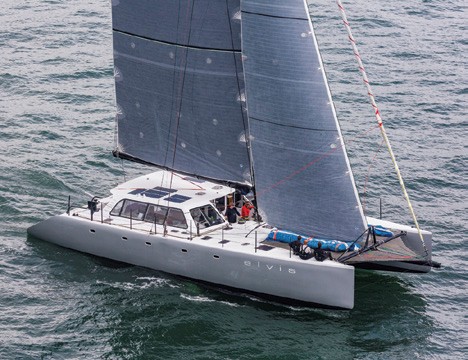By Chad Corning
 Twenty-eighteen marked the first year multihulls were invited to compete in the Newport Bermuda Race, and we were thrilled to take part with Jason Carroll’s Gunboat 62 Elvis. Elvis has been much modified from original, and now sports a 28-meter rotating mast, external tillers and deep asymmetric daggerboards, all of which puts a bit of spring in her step, especially in lighter air. This would prove a decisive asset in this year’s race.
Twenty-eighteen marked the first year multihulls were invited to compete in the Newport Bermuda Race, and we were thrilled to take part with Jason Carroll’s Gunboat 62 Elvis. Elvis has been much modified from original, and now sports a 28-meter rotating mast, external tillers and deep asymmetric daggerboards, all of which puts a bit of spring in her step, especially in lighter air. This would prove a decisive asset in this year’s race.
Still The King: Elvis is the first multihull winner of the Newport Bermuda Race. © Daniel Forster
We were in good company with Greg Gigliotti’s Gunboat 62 Tribe (also with a taller rig), and NYYC Commodore Phil Lotz with his Gunboat 60 Arethusa – both very well sailed and well organized campaigns.
Forecasts varied wildly the week before the race. Early on it looked like very strong northwesterly breeze would feature, but this fizzled away to a lighter and more complicated weather scenario. The first hurdle was getting away from Newport. Race day saw overcast skies and the typical mid-day northerly/southerly battle loitering around the start line. Eventually a gentle southwesterly settled in for the start, which, with a strong outgoing tide, would get the fleet on its way. Starting around the same time as the fleet and heading south was a high pressure ridge which would eventually overtake most yachts and make the race a very benign affair. If you could make it through the ridge, moderate northeasterly winds would provide an easy ride to the Onion Patch, but only a few of the faster boats would be so lucky.
Aboard Elvis, we had a good start on port and held that out to Point Judith. As the breeze began to clock, we flipped onto starboard and gradually eased sheets and headed directly for our Gulf Stream entry point. All the multis were close together at this point and the sailing was relatively fast, with reaching spinnakers featuring as the wind continued to lift. After a very pleasant evening of sailing, we had managed to eke out a bit of a lead and were sailing in company with Proteus and the two Volvo 70s. The wind started to evaporate as Saturday went on, and by late afternoon we knew it was make or break time to get through the high pressure ridge. One hundred-degree shifts, big puffs and lulls and towering, wind-sucking clouds made the transition zone challenging. Frequent jibes and sail changes featured, with the goal of keeping the boat moving and going generally south being paramount. In the end we just made it through and were comforted to see the barometer drop and wind speeds increase into the mid-teens.
The balance of the race for us was almost entirely under spinnaker sailing fast; about a 14-knot average from the transition to the finish. After a five-hour onboard repair of the A2, we tried it for a bit but it failed again in the clew patch area so we had to settle for the smaller, but fairly efficient A6 in its place. The rubber band connecting us to Tribe and Arethusa stretched out and eventually broke as they were engulfed by the high and had to suffer a prolonged period of very light air sailing – not something multihulls exactly relish. The wind held all the way to the finish for us and we crossed the line in the pre-dawn hours on Monday with an elapsed time of around 63 hours. At the end of the day, only five boats made it to the “promised land” on the other side of the ridge: line honors winner Rambler, the two Volvo 70s, Proteus and, by the skin of our teeth, us.
The traditional festivities upon arrival at the Royal Bermuda Yacht Club were muted to say the least, as the Maxi crews had all gone to bed by the time we got there. Not a soul – or a bartender – to be seen, but luckily some onboard supplies saw us through. It was an honor to be the first multihull to finish the Newport Bermuda Race. Good sailing, and a lot of luck saw us get through the main weather feature and to Bermuda about 36 hours in front of our division rivals. Many thanks to the event organizers for including multihulls this year and going forward. We look forward to taking on the challenge again in 2020!
A professional sailor, program manager, build manager and coach, Chad Corning is a two-time Melges 32 National Champion, two-time Viper 640 National Champion, Shields National Champion, and Melges 32 European Champion.




